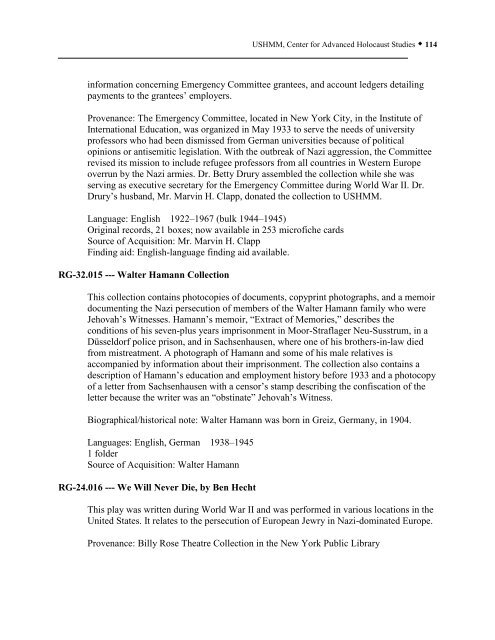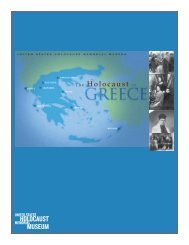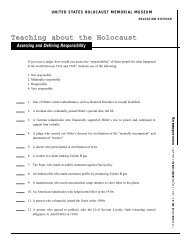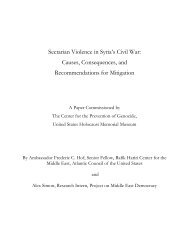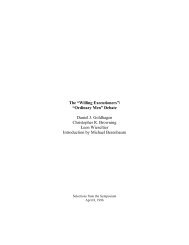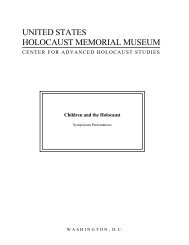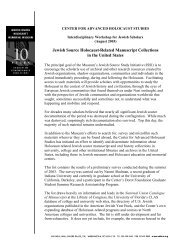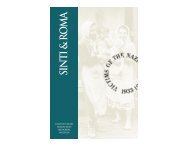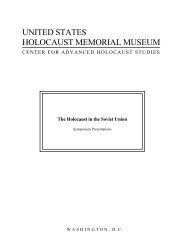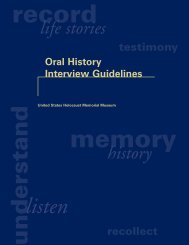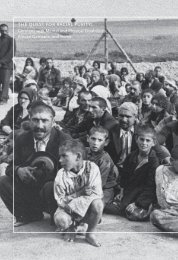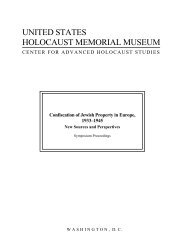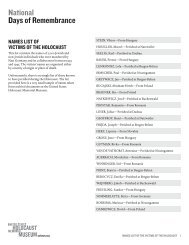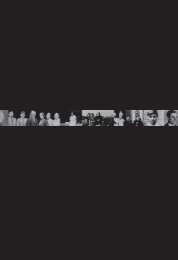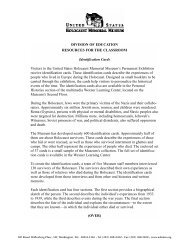- Page 1 and 2:
USHMM, Center for Advanced Holocaus
- Page 3 and 4:
USHMM, Center for Advanced Holocaus
- Page 5 and 6:
USHMM, Center for Advanced Holocaus
- Page 7 and 8:
RG-02.007 --- ―Shari: A True Stor
- Page 9 and 10:
Accession 1999.A.0267 --- Ludwig Ch
- Page 11 and 12:
Language: English 1989 1 folder Sou
- Page 13 and 14:
Languages: English, Hebrew, Yiddish
- Page 15 and 16:
USHMM, Center for Advanced Holocaus
- Page 17 and 18:
USHMM, Center for Advanced Holocaus
- Page 19 and 20:
Accession 1997.123 --- The Manfred
- Page 21 and 22:
USHMM, Center for Advanced Holocaus
- Page 23 and 24:
Accession 1999.69 --- The Hans Cahn
- Page 25 and 26:
Language: English 1957-1986 1 folde
- Page 27 and 28:
Languages: English, German 1938-193
- Page 29 and 30:
See the finding aid for this collec
- Page 31 and 32:
Accession 1999.119 --- The Alfred B
- Page 33 and 34:
Accession 1989.115 --- The Hebrew I
- Page 35 and 36:
Languages: English, German 1941-194
- Page 37 and 38:
RG-02.059 --- Coenraad Rood Papers
- Page 39 and 40:
USHMM, Center for Advanced Holocaus
- Page 41 and 42:
Source of Acquisition: Sender Wajsm
- Page 43 and 44:
USHMM, Center for Advanced Holocaus
- Page 45 and 46:
Language: English 1989 0.25 linear
- Page 47 and 48:
RG-14.009 --- Adolf Hitler‘s Poli
- Page 49 and 50:
Languages: English, German Ca. 1992
- Page 51 and 52:
USHMM, Center for Advanced Holocaus
- Page 53 and 54:
RG-06.023 --- Juozas Kungys Case US
- Page 55 and 56:
USHMM, Center for Advanced Holocaus
- Page 57 and 58:
USHMM, Center for Advanced Holocaus
- Page 59 and 60:
See the finding aid for this collec
- Page 61 and 62:
Languages: German, French, English,
- Page 63 and 64: USHMM, Center for Advanced Holocaus
- Page 65 and 66: See the finding aid for this collec
- Page 67 and 68: USHMM, Center for Advanced Holocaus
- Page 69 and 70: USHMM, Center for Advanced Holocaus
- Page 71 and 72: USHMM, Center for Advanced Holocaus
- Page 73 and 74: USHMM, Center for Advanced Holocaus
- Page 75 and 76: RG-10.121 --- Jack Grootkerk Memoir
- Page 77 and 78: USHMM, Center for Advanced Holocaus
- Page 79 and 80: USHMM, Center for Advanced Holocaus
- Page 81 and 82: Languages: French, English, German
- Page 83 and 84: RG-10.045 --- Charles Kotkowsky Pap
- Page 85 and 86: USHMM, Center for Advanced Holocaus
- Page 87 and 88: Languages: English, German 1943-198
- Page 89 and 90: USHMM, Center for Advanced Holocaus
- Page 91 and 92: Language: English 1968 4 folders So
- Page 93 and 94: Language: English Ca. 1996 1 item (
- Page 95 and 96: Accession 2000.103 --- Liebermann F
- Page 97 and 98: RG-02.146 --- ―If My Heart Didn
- Page 99 and 100: USHMM, Center for Advanced Holocaus
- Page 101 and 102: Language: English 1945-1980 3 micro
- Page 103 and 104: USHMM, Center for Advanced Holocaus
- Page 105 and 106: USHMM, Center for Advanced Holocaus
- Page 107 and 108: RG-02.053 --- Janina Spinner Mehlbe
- Page 109 and 110: Languages: Serbo-Croatian, English
- Page 111 and 112: Language: English 1938-1949 98 micr
- Page 113: Languages: English, German 1945-194
- Page 117 and 118: Languages: English, German 1936-194
- Page 119 and 120: Source of Acquisition: Dr. Hadassah
- Page 121 and 122: RG-52.013 --- British Records Relat
- Page 123 and 124: Source of Acquisition: Benjamin B.
- Page 125 and 126: USHMM, Center for Advanced Holocaus
- Page 127 and 128: USHMM, Center for Advanced Holocaus
- Page 129 and 130: Finding aid: Folder-level descripti
- Page 131 and 132: USHMM, Center for Advanced Holocaus
- Page 133 and 134: RG-06.002.02 --- Seymour Krieger Pa
- Page 135 and 136: USHMM, Center for Advanced Holocaus
- Page 137 and 138: USHMM, Center for Advanced Holocaus
- Page 139 and 140: USHMM, Center for Advanced Holocaus
- Page 141 and 142: USHMM, Center for Advanced Holocaus
- Page 143 and 144: Source of Acquisition: Ministry of
- Page 145 and 146: Languages: English, Portuguese, Ger
- Page 147 and 148: USHMM, Center for Advanced Holocaus
- Page 149 and 150: USHMM, Center for Advanced Holocaus
- Page 151 and 152: RG-10.154 --- Emanuel E. and Doroth
- Page 153 and 154: USHMM, Center for Advanced Holocaus
- Page 155 and 156: USHMM, Center for Advanced Holocaus
- Page 157 and 158: USHMM, Center for Advanced Holocaus
- Page 159 and 160: USHMM, Center for Advanced Holocaus
- Page 161 and 162: USHMM, Center for Advanced Holocaus
- Page 163 and 164: USHMM, Center for Advanced Holocaus
- Page 165 and 166:
USHMM, Center for Advanced Holocaus
- Page 167 and 168:
USHMM, Center for Advanced Holocaus
- Page 169 and 170:
RG-02.005 ―My Deportation‖ by B
- Page 171 and 172:
USHMM, Center for Advanced Holocaus
- Page 173 and 174:
1.75 linear inches Restrictions: Pu
- Page 175 and 176:
Provenance: Source of acquisition i
- Page 177 and 178:
Provenance: Source of acquisition i
- Page 179 and 180:
Finding Aids: Index at beginning of
- Page 181 and 182:
RG-02.072 Memories of a Vanished Wo
- Page 183 and 184:
Languages: English 2.5 linear inche
- Page 185 and 186:
Languages: English 2 folders RG-02.
- Page 187 and 188:
USHMM, Center for Advanced Holocaus
- Page 189 and 190:
Languages: English 0.5 linear inche
- Page 191 and 192:
RG-02.141 Nadia Gould Collection, N
- Page 193 and 194:
1 microfiche card Restrictions: Fai
- Page 195 and 196:
Restrictions: Fair use only USHMM,
- Page 197 and 198:
Restrictions: Fair use only RG-02.1
- Page 199 and 200:
USHMM, Center for Advanced Holocaus
- Page 201 and 202:
Provenance: Source of acquisition i
- Page 203 and 204:
USHMM, Center for Advanced Holocaus
- Page 205 and 206:
Provenance: Source of acquisition i
- Page 207 and 208:
USHMM, Center for Advanced Holocaus
- Page 209 and 210:
RG-05.010 Short Stories about the
- Page 211 and 212:
USHMM, Center for Advanced Holocaus
- Page 213 and 214:
USHMM, Center for Advanced Holocaus
- Page 215 and 216:
RG-06.013 Report of a War Crimes Tr
- Page 217 and 218:
RG-06.020 Isaac Stone Collection, 1
- Page 219 and 220:
USHMM, Center for Advanced Holocaus
- Page 221 and 222:
RG-10.026 Booth Family Papers, 1940
- Page 223 and 224:
RG-10.045 Charles Kotkowsky Papers,
- Page 225 and 226:
USHMM, Center for Advanced Holocaus
- Page 227 and 228:
23 folders Finding Aids: Folder-lev
- Page 229 and 230:
RG-10.129 Simon Klein Letters, 1945
- Page 231 and 232:
USHMM, Center for Advanced Holocaus
- Page 233 and 234:
USHMM, Center for Advanced Holocaus
- Page 235 and 236:
USHMM, Center for Advanced Holocaus
- Page 237 and 238:
USHMM, Center for Advanced Holocaus
- Page 239 and 240:
Languages: Polish, German, and Engl
- Page 241 and 242:
USHMM, Center for Advanced Holocaus
- Page 243 and 244:
RG-19.008 ―One Family‘s Story,
- Page 245 and 246:
USHMM, Center for Advanced Holocaus
- Page 247 and 248:
USHMM, Center for Advanced Holocaus
- Page 249 and 250:
USHMM, Center for Advanced Holocaus
- Page 251 and 252:
USHMM, Center for Advanced Holocaus
- Page 253 and 254:
Finding Aids: Item-level descriptio
- Page 255 and 256:
RG-20.003 Oskar Schindler Papers, 1
- Page 257 and 258:
Provenance: Source of acquisition i
- Page 259 and 260:
RG-20.017 Fight for Thirteen, 1983
- Page 261 and 262:
USHMM, Center for Advanced Holocaus
- Page 263 and 264:
USHMM, Center for Advanced Holocaus
- Page 265 and 266:
RG-25.020 Selected Records from Rom
- Page 267 and 268:
Folders: Articles and Clippings, 19
- Page 269 and 270:
USHMM, Center for Advanced Holocaus
- Page 271 and 272:
USHMM, Center for Advanced Holocaus
- Page 273 and 274:
USHMM, Center for Advanced Holocaus
- Page 275 and 276:
Languages: Polish, German, French,
- Page 277 and 278:
USHMM, Center for Advanced Holocaus
- Page 279 and 280:
USHMM, Center for Advanced Holocaus
- Page 281 and 282:
USHMM, Center for Advanced Holocaus
- Page 283 and 284:
USHMM, Center for Advanced Holocaus
- Page 285 and 286:
1 folder USHMM, Center for Advanced
- Page 287 and 288:
USHMM, Center for Advanced Holocaus
- Page 289 and 290:
USHMM, Center for Advanced Holocaus
- Page 291 and 292:
USHMM, Center for Advanced Holocaus
- Page 293 and 294:
USHMM, Center for Advanced Holocaus
- Page 295 and 296:
USHMM, Center for Advanced Holocaus
- Page 297 and 298:
USHMM, Center for Advanced Holocaus
- Page 299 and 300:
USHMM, Center for Advanced Holocaus
- Page 301 and 302:
USHMM, Center for Advanced Holocaus
- Page 303 and 304:
USHMM, Center for Advanced Holocaus
- Page 305 and 306:
USHMM, Center for Advanced Holocaus
- Page 307 and 308:
Languages: English 29 microfilm rol
- Page 309 and 310:
Provenance: Source of acquisition i
- Page 311 and 312:
USHMM, Center for Advanced Holocaus
- Page 313 and 314:
USHMM, Center for Advanced Holocaus
- Page 315 and 316:
USHMM, Center for Advanced Holocaus
- Page 317 and 318:
USHMM, Center for Advanced Holocaus
- Page 319 and 320:
Finding Aids: Item-level list Acces
- Page 321 and 322:
USHMM, Center for Advanced Holocaus
- Page 323 and 324:
Accession 2000.8 Isaiah Trunk Paper
- Page 325 and 326:
USHMM, Center for Advanced Holocaus
- Page 327 and 328:
Provenance: Source of acquisition i


